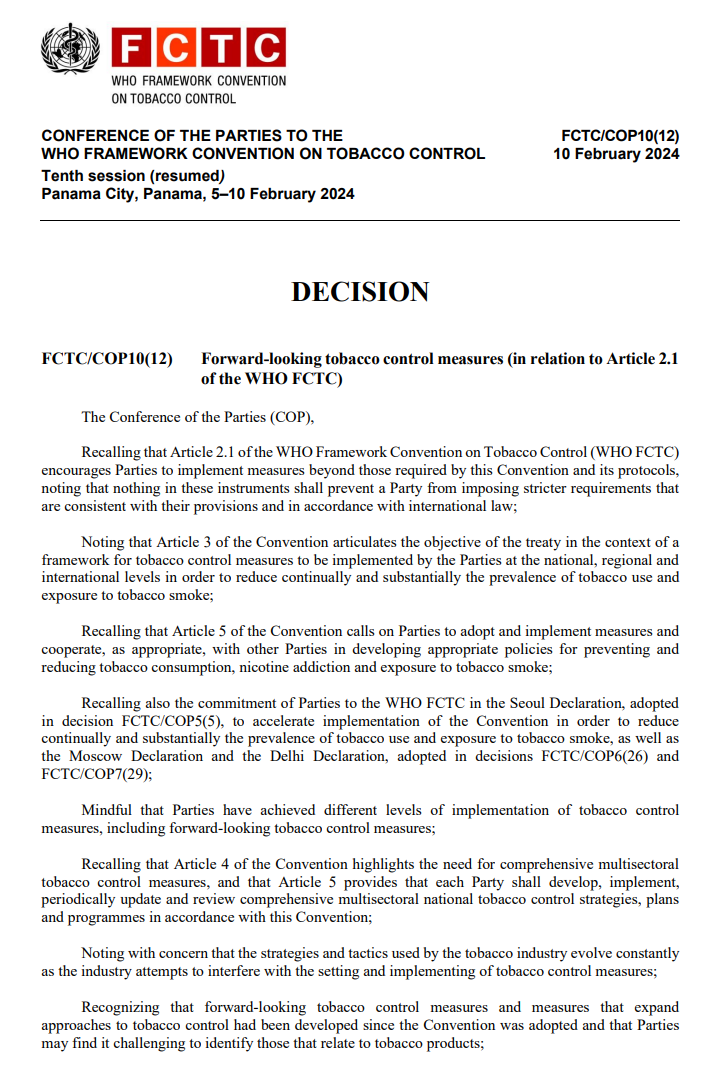The Tenth Conference of the Parties (COP 10) of the WHO Framework Convention on Tobacco Control (FCTC) adopted a series of key Decisions including a decision entitled “Forward-looking tobacco control measures (in relation to Article 2.1 of the WHO FCTC)” that addresses innovative policies aimed at ending the tobacco epidemic.

ASH is a proud supporter of this Decision and was honored to be asked by the sponsor – Canada – to present on the topic at the official side event.
Article 2.1 calls on Parties to go beyond the specific obligations of the FCTC and was included in the original treaty to ensure that these obligations were seen as a floor and not a ceiling, and to protect national laws that go beyond those minimum measures. It was also an acknowledgement that the FCTC was negotiated at the turn of the century and employed best practices, a standard that would surely evolve over time. ASH and Project Sunset have pointed to Article 2.1 as the “endgame article” for years.
Several countries objected to the draft Article 2.1 Decision, but the vast majority stepped forward to support. This is a reflection of the change in attitudes toward the tobacco epidemic over the past 20 years, from a paradigm of mitigating the tobacco epidemic to implementing policies aimed at ending it. There was also universal support from civil society organizations.
Key Elements of the COP10 Article 18 Decision:
DECIDES:
(a) to establish an expert group on tobacco control measures that are forward-looking and could be contemplated within the scope of Article 2.1 of the WHO FCTC;
(b) to mandate the expert group:
(i) to identify and describe forward-looking tobacco control measures and measures that expand or intensify approaches to tobacco control as they apply to tobacco products, and that may be contemplated by the expert group within the scope of Article 2.1, taking into account the Guidelines for implementation of the WHO FCTC;
(ii) to consider, in conducting its research and elaborating its findings, Party experience and published literature, as well as any other source of information that it may find appropriate, and properly reference all sources; and
(iii) to prepare a report to be submitted to the Eleventh session of the COP on the above matters;
REQUESTS the Convention Secretariat:
(a) under the guidance of the Bureau, to set out the terms of reference of the expert group in accordance with the above mandate and to facilitate the establishment of the expert group, to be composed of:
(i) up to 12 members, with appropriate technical experience relevant to the mandate of the expert group and ensuring regional balance to as great an extent as possible; and
(ii) up to two observers with relevant expertise that represent civil society organizations that are accredited observers to the COP;
(b) to invite the Knowledge Hubs to provide relevant information to the expert group;
(c) to invite the World Health Organization to provide technical support to the expert group;
(d) to make the necessary arrangements, including budgetary arrangements, for the expert group to complete its work using electronic means of communication to as great an extent as possible.
Next Steps:
The FCTC Bureau, in consultation with the FCTC Secretariat, is charged with creating the expert group on “forward-looking measures” and to set out the terms of reference.
It will be critical to ensure that the 12 expert group members are chosen for their expertise and vision.
The tobacco industry will surely push to include allies that will fight against including strong policies.
ASH will work with the Bureau, the Project Sunset steering committees, FCTC Knowledge Hubs, the Secretariat, civil society organizations, and allied governments to ensure that the report submitted to COP11 is a blueprint for ending the tobacco epidemic and a refutation of a “business as usual” attitude.








